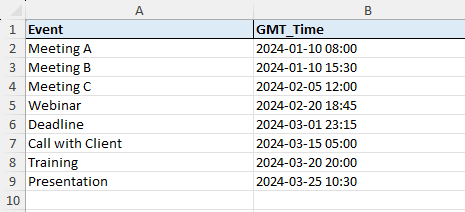Working with time zones in Excel is a common requirement for global teams. If your data is stored in GMT (Greenwich Mean Time) but your reporting or scheduling needs to align with IST (Indian Standard Time), you can use simple Excel formulas to adjust the time by adding 5 hours and 30 minutes. This guide will show you exactly how to set it up for GMT to IST, avoid common mistakes, and explore advanced scenarios with Power Query and VBA.
Key Takeaways
- IST is 5 hours 30 minutes ahead of GMT.
- You can convert GMT to IST with
=A2+TIME(5,30,0). - Formatting the result correctly is crucial to display both date and time.
- Power Query can handle bulk conversions more efficiently.
- VBA allows creating a reusable custom function for conversions.
Table of Contents
What does converting GMT to IST mean in Excel
Excel stores dates and times as serial numbers, where the integer part represents the date and the decimal part represents the time of day. To convert from GMT to IST, you add 5 hours and 30 minutes to the GMT time. For example, 08:00 GMT becomes 13:30 IST on the same day.
Step by step example using the workbook
Our raw data contains a list of events and their scheduled GMT times.
In column C, the formula =B2+TIME(5,30,0) is used to add 5 hours and 30 minutes.
This adjusts each GMT time to IST while keeping the correct date.
Check to see the correctly converted IST times for all events.
How to convert GMT to IST in Excel
1. Basic formula:
=A2+TIME(5,30,0)This adds 5 hours 30 minutes to the time in A2.
2. Formatting the result:
After applying the formula, go to Format Cells > Custom and select yyyy-mm-dd hh:mm to display both date and time.
3. Using VBA custom function:
Function GMTtoIST(gmtTime As Date) As Date
GMTtoIST = gmtTime + TimeSerial(5, 30, 0)
End Function
Use =GMTtoIST(A2) in a worksheet cell after enabling macros.
Common mistakes and tips
Incorrect time format: If the result only shows a number, apply Date/Time formatting.
Overwriting the original time: Keep GMT and IST in separate columns for clarity.
Day change ignored: Adding 5 hours 30 minutes may shift the date forward or backward. Always check date values, not just time.
Not accounting for data type: Ensure that GMT values are valid Excel Date/Time values, not text. Convert with =VALUE(A2) if necessary.
Bonus tips and advanced scenarios
Round to nearest minute: Use =MROUND(A2+TIME(5,30,0),"0:01") to avoid second-level decimals in conversions.
Convert multiple time zones: Create a helper table with time zone offsets and use =A2+VLOOKUP("IST",Table,2,FALSE).
Power Query automation: Import your dataset into Power Query, add a custom column with [GMT_Time] + #duration(0,5,30,0), and load back into Excel.
Dynamic offset with cell reference: Instead of fixed TIME(5,30,0), reference a cell that contains the offset value (e.g., 0.22917 for 5.5 hours).
Use cases
Meeting scheduling. Convert global meeting schedules from GMT to IST so local teams know the correct start time.
Why it matters: Global organizations often share invites in GMT, but Indian participants need clarity in IST to avoid confusion or missed meetings.
How to do it: If the GMT time is in column B, use =B2+TIME(5,30,0) in column C to display IST time. Format cells as yyyy-mm-dd hh:mm for consistency.
Practical add-on: Create a helper column that shows both GMT and IST side by side. This way, users can cross-check the values easily.
Benefit: Teams in India get a clear view of meeting times, reducing scheduling errors and avoiding accidental late or early logins.
Webinar planning. Adjust published webinar times for attendees in India.
Why it matters: Webinars often target multiple regions. A webinar scheduled at 10:00 GMT occurs at 15:30 IST, and publishing the wrong time zone can reduce attendance.
How to do it: Add a column for IST times using =B2+TIME(5,30,0). Use conditional formatting to highlight the local IST time for promotion in India-specific marketing emails.
Practical add-on: Create a template with a drop-down for time zones and a lookup table of offsets. This allows instant conversion not just to IST, but also to EST, PST, or CET if required.
Benefit: Helps ensure accurate communication of event schedules, increases participation, and improves audience experience.
Deadline tracking. Ensure project deadlines sent in GMT are properly understood in IST.
Why it matters: Misinterpreting GMT deadlines as local time can lead to missed submissions or incomplete work. For example, a deadline of 23:00 GMT is actually 04:30 IST the next day.
How to do it: Store GMT deadlines in one column and use =A2+TIME(5,30,0) in another column to display IST equivalents. Apply dd-mmm-yyyy hh:mm AM/PM formatting to clearly show date and time.
Practical add-on: Add conditional formatting to highlight deadlines within the next 24 hours in IST. This gives teams visual alerts.
Benefit: Avoids missed project milestones, ensures clarity across teams, and aligns deliverables with global schedules.
FAQ
1. How many hours ahead is IST compared to GMT?
IST is 5 hours 30 minutes ahead of GMT.
2. What is the Excel formula for GMT to IST?
Use =A2+TIME(5,30,0) where A2 contains the GMT time.
3. What if the date changes after conversion?
Excel automatically updates the date if adding 5 hours 30 minutes crosses midnight.
4. Can I convert multiple rows at once?
Yes, enter the formula in the first row and drag down. It applies the conversion to all rows.
5. Is daylight savings time applied in IST?
No. IST does not use daylight savings time, so the offset is always +5:30 from GMT.
John Michaloudis is a former accountant and finance analyst at General Electric, a Microsoft MVP since 2020, an Amazon #1 bestselling author of 4 Microsoft Excel books and teacher of Microsoft Excel & Office over at his flagship MyExcelOnline Academy Online Course.










